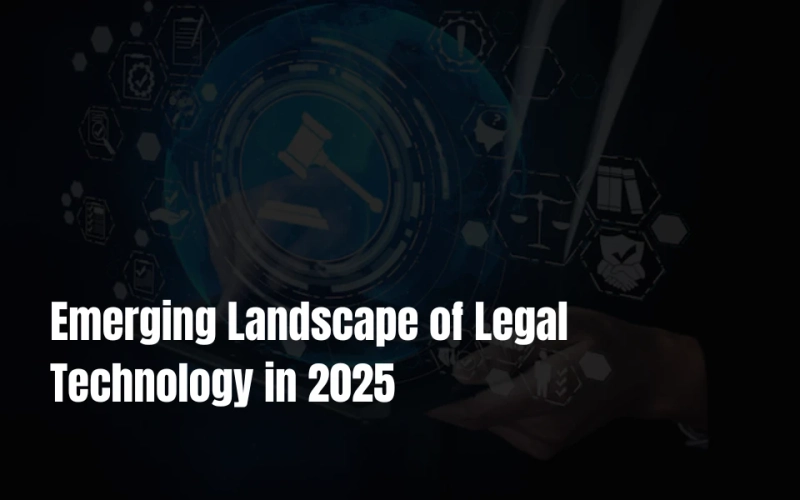Introduction
Legal technology has transitioned from being a support function to a core enabler of modern-day law practices. In 2025, with unprecedented change to the legal industry, thanks to AI, automation, cloud solutions, and advanced analytics, not only are technology-based advancements streamlining workflows, but they are also totally redefining how law firms and legal departments deliver value to clients.
Organizations that embrace next-generation technology are far ahead in achieving faster case resolutions, improving compliance, and gaining a significant competitive edge. As the industry evolves, legal professionals are being compelled to rethink traditional processes and embrace a technology-first approach.
Evolution of Legal Technology: From Supportive Tools to Strategic Enablers
Legal technology began as basic document management systems and case tracking software. These systems allowed law firms to digitize paper-based processes while providing better access to information. Early solutions did not have any intelligence behind them and assisted with tasks more than enabling growth within the firm.
The evolution of legal technology, now referred to as the legal technology ecosystem, has evolved into a range of AI-enabled platforms, predictive analytics, online collaboration tools, and digital compliance systems that provide firms the ability to get real-time insight while maintaining the database securely and facilitating better client experiences. It has only made the legal industry more agile, efficient, and forward-looking legal industry.
Core Components of Modern Legal Technology
AI-driven Legal Research
Artificial Intelligence has become a cornerstone of legal technology, allowing firms to conduct more thorough, quicker research. AI can analyze extensive legal databases, parse past precedents, report legal issues, and potentially even assist in case strategy, allowing lawyers to cut down on cumbersome manual research time.
As AI systems are embraced, predictive legal analysis is also now feasible - AI can calculate outcomes based on previous decisions and contextual elements. The benefits are not only a quicker result, the outcome is likely to be far more accurate.
Advanced Document Automation
Drafting legal documents has always been a time-consuming process. Firms will now be able to generate contracts, compliance reports, or litigation in minutes with advanced automation tools. Document automation not only eliminates human error, but firms can now spend more time completing valuable legal tasks while the computer does the heavy lifting.
Beyond speed, document automation enhances consistency, ensuring compliance with evolving legal standards while improving operational scalability.
Emerging Trends in Legal Technology for 2025
Predictive Legal Systems Powered by AI
One of the most impactful trends in the legal space is the development of AI-powered platforms that produce predictive insights. This type of technology allows an artificial intelligence system to produce output recommendations based on historical data and develop legal precedents. Areas include developing potential legal strategies, estimating risks, and determining the strengths of cases.
By 2025, these platforms should be more than simple data analysis and provide real-time advisory help and assist with virtual hearing support using AI-based reasoning engines.
Integrity of Contracts on Blockchains
Smart contracts are a powerful idea that is beginning to take hold as a unique way of executing agreements. These contracts are self-executing, tamper-proof, and provide real-time verification of compliance milestones.
This novel technology will eliminate disputes over authenticity, while also providing the transparency desired in all transactions, especially high-value corporate and financial transactions.
Cloud-Native Collaboration Ecosystems
The legal sector is rapidly adopting cloud-native platforms to enable remote collaboration, secure storage, and real-time data access. With cyber threats increasing, advanced encryption protocols ensure compliance with stringent regulatory frameworks while supporting global legal operations.
Moreover, cloud-native solutions allow firms to scale their technology stack based on demand, ensuring cost efficiency and resilience.
Benefits of Embracing Legal Technology
The use of legal technology will provide other benefits that are more than just operational efficiencies. Lawyers are utilizing platforms that deliver transparency, better profitability, and compliance, and support client experience.
Some of the benefits include faster time to case preparation, more security for documents, collaboration with teams in other jurisdictions, and time, because with predictive analytics and AI-enabled, lawyers are reviewing decisions instead of administrative tasks.
Overcoming Challenges in Legal Technology Adoption
Barriers to Change and Training Limitations
Even when the benefits are obvious, some legal practitioners resist using new technologies because they are accustomed to working within specific workflows. To alleviate this issue, comprehensive training programs, leadership buy-in, and demonstrable ROI (pilot program implementations) are needed.
Ongoing professional development will allow legal teams to become more comfortable and proficient in using technology (modern solutions), bridging the gap between traditional practices and modern solutions.
Data Privacy & Compliance Risks
Managing sensitive legal data requires effective cybersecurity protocols. Law firms must comply with global privacy laws (GDPR & CCPA) while maintaining the confidentiality of sensitive information. Advanced cybersecurity measures (strong encryption, multi-factor authentication, and blockchain) can help to mitigate these risks.
Conclusion
The legal industry is experiencing a once-in-a-lifetime transformation in which technology is no longer an option but a necessity. Firms that implement AI-driven research, blockchain security measures, and cloud-native operations for efficiency will emerge as the innovators and leaders of tomorrow, delivering faster, smarter, and more dependable legal services.



